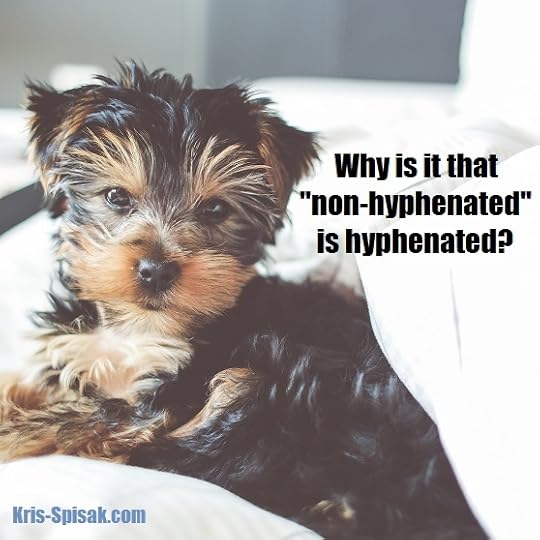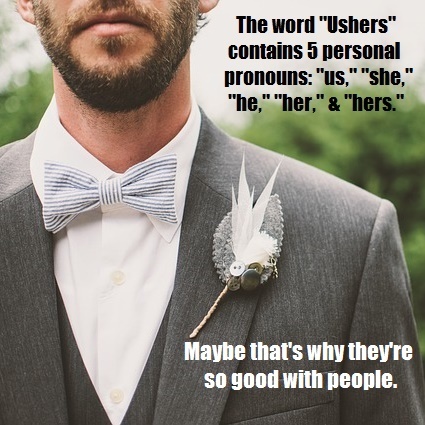Kris Spisak's Blog, page 31
January 16, 2017
Trivia: HOITY-TOITY
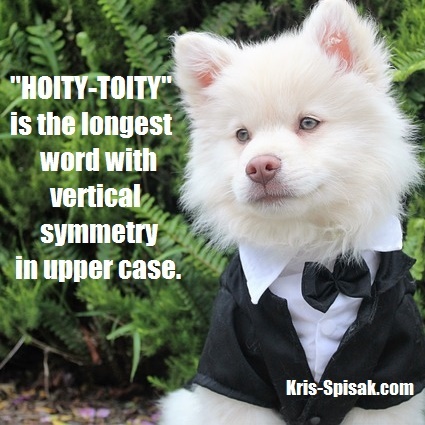
And just in case you’re curious, the longest English word with horizontal symmetry is “CHECKBOOK.”
Aren’t you glad you now know these things?
Sign-up for my writing tips email newsletter for more word trivia like this.
The post Trivia: HOITY-TOITY appeared first on Kris Spisak.
January 14, 2017
Authors on Editing: Interview with Kevin Smokler
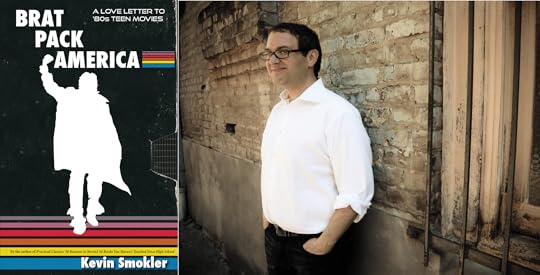
Have you ever started a book and the farther you read, the further you delved into a past version of yourself? Sometimes it happens between the pages of a novel; sometimes it happens in the fluid emotion of a poem or the intense illustrations of a comic or graphic novel.
We sometimes forget that there’s an author behind the work, evoking these memories and setting the tone that pulls us back, but these writers are hard at work behind the scenes. One such non-fiction writer, Kevin Smokler, was kind enough to join me to talk about his editing process.

Kevin Smokler (@weegee on Twitter) is the author of the new book Brat Pack America: A Love Letter to 80s Teen Movies, which the Library Journal called “pure delight,” and the 2013 essay collection Practical Classics: 50 Reasons to Reread 50 Books you Haven’t Touched Since High School. His essays and cultural criticism have appeared in Salon, Buzzfeed, Vulture, Fast Company, and on NPR. He lives in San Francisco with his wife, cat, books, and vinyl records.
Q & A with Non-Fiction Writer Kevin Smokler
Kevin: I know grammar is important, but I need to save that energy for arguments over whether Andie should have ended up with Blaine or Duckie in “Pretty in Pink.”
Kris: Fair point. We’ll turn to other parts of the editing process then, because it’s so much more than subject-verb agreement and proper comma placement, isn’t it?
Your voice rings so true in your writing–sincere, personable, casual guy I want to grab a beer with and talk about old high school English class assignments and pop culture that inspired me. I don’t want to go into how a writer finds their voice or their tone for a project, but how do you edit to stay true to your voice? Do you have any tips or techniques for other writers?
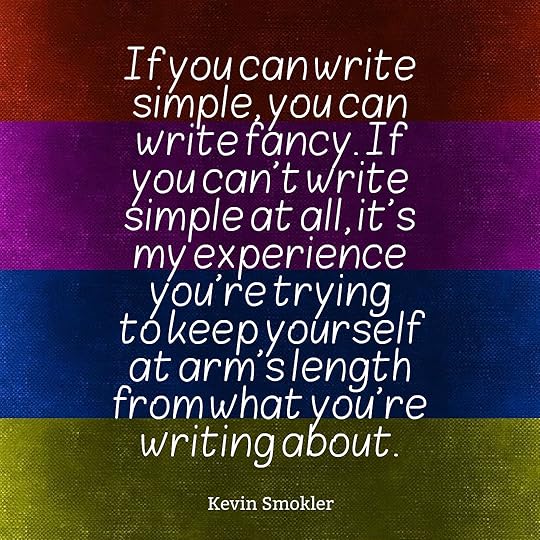 Kevin: Boy, thanks for saying so! When readers tell me I write like I talk, I take that as the highest kind of compliment.
Kevin: Boy, thanks for saying so! When readers tell me I write like I talk, I take that as the highest kind of compliment.
In terms of how I do it, I think non-fiction gives you a natural advantage as a writer in that the subject does a fair amount the work in making the piece interesting, and my voice doesn’t have to march at the head of the parade the same way it has to in fiction. That said, even as someone who writes non-fiction books about culture, I had to learn to build first and paint second, i.e. say what’s on your mind in as basic and straightforward a way possible, even if you have to recite it out loud while nobody’s listening, and then, if the passage calls for it get fancy with a metaphor, a turn of phrase, or the right 50 cent word. Often it doesn’t, and straightforward and basic is exactly what that moment calls for.
I understand the idea of being true to yourself in your writing and that if you think and talk in dark passages and twisting corridors, why can’t you write like that? You can, but come to it from time and experience, from trying and failing and being edited and being told it doesn’t work and trying to write in super simple terms. Because I promise if you can write simple, you can write fancy. If you can’t write simple at all, it’s my experience you’re trying to keep yourself at arm’s length from what you’re writing about, which always reads worse than it should.
Kris: Speaking of time and experience, what do you wish a younger version of yourself knew about the process of editing a book or any other type of writing project or communication?
Kevin: That this is work, as in manual labor. Its crazy sexy fun, yes. If it wasn’t, no one would do it—and no one would want to be a writer if it wasn’t intensely erotic to say “I am a writer”—but that doesn’t mean that writing is romantic or sexy or fun. Often it’s pushing oak barrels up a hill over and over again, only the barrels are words. The hardest and best and most important part is getting over feeling self-important about it an just doing it.
Or as an old teacher of mine liked to say. “No such thing as writer’s block. Writer’s Block is the unwillingness to be bad.” Be bad, be awful, be wretchedly dreadful, shit-ass awful. Because you can always be better. But you can’t even get to awful if you don’t start.
Kris: When you’re editing your own books, do ever think about how you need to do justice to the other works you refer to–either the classic literature you discuss in Practical Classics or the 1980s films in Brat Pack America? How does that play a role in your final read-through?
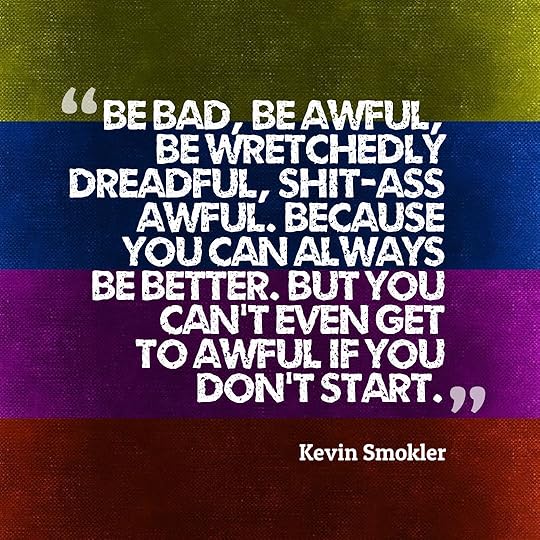 Kevin: Anything in culture that’s worth writing about is worth being turned over and examined and kicked in the shins. My obligation to it is to spend quality time with it, educate myself on what’s been said before by smarter people than me and make sure my own thoughts aren’t coming from my own prejudices and shortcomings. Because it ain’t writing if you’re just confirming what you already know or think or leaning into your blind spots.
Kevin: Anything in culture that’s worth writing about is worth being turned over and examined and kicked in the shins. My obligation to it is to spend quality time with it, educate myself on what’s been said before by smarter people than me and make sure my own thoughts aren’t coming from my own prejudices and shortcomings. Because it ain’t writing if you’re just confirming what you already know or think or leaning into your blind spots.
Your obligation is to be fair and thorough but not worshipful. A book, a play, a song, a work of art that’s out in the world belongs to everyone, including you, and not just those who will say nice things about it.
Kris: What about the nice things in the creative process? Some writers’ favorite part is the research; others love the drafting and crafting; others love the later editing stages. What is your favorite part of writing a book and why?
Kevin: Jeez, that’s hard. I love research because that’s learning new stuff and what’s more fun than that? I like the middle and end parts of writing because that’s when the words and lines all start to sing in unison. The beginning, what Twyla Tharp calls, “the white room” still scares me. I usually have to say some version of “F-This” to the universe and then start babbling nonsense all over the page before I actually get anywhere.
Kris: I hold that babbling nonsense is often an essential part of the creative process! But when you’re working on those final stages of making “the words and lines singing in unison”—which I love—are there any words you know you overuse that you always pay special attention to?
Kevin: Too often, I’ll forget I used a phrase 15 pages ago and repeat myself 20 odd times, before I catch on that I am essentially writing the equivalent of a nervous tick.
Something I tell my students a lot: “The reader can always tell when you haven’t ‘gone there,’ when you haven’t gotten close to the emotional heart of what you are writing about and instead have used a lot of fancy language or worse, vague, bloodless language as a way of not really wrestling with what is at the dead center, the vibrating soul of your piece. And the moment the reader gets wind of you caring less than they do, it’s over. Pack up and go home. You’ve lost them.
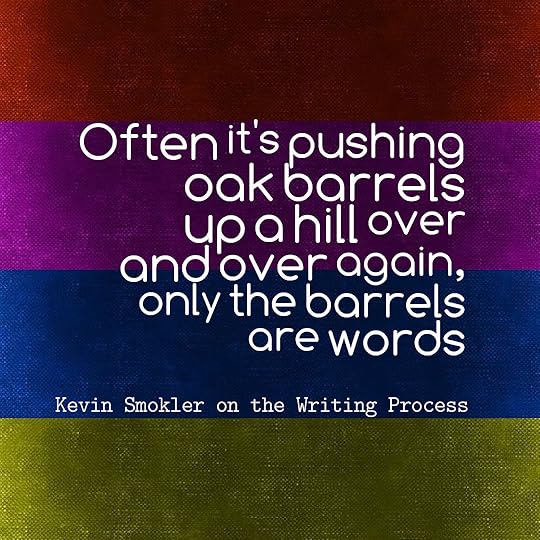 Kris: And after all of your tweaking and proofreading, how do you know your editing process is finished and the book or article you’re working on is officially “done”?
Kris: And after all of your tweaking and proofreading, how do you know your editing process is finished and the book or article you’re working on is officially “done”?
Kevin: When you are ruthlessly honest with yourself and you can answer the question: Am I making this better or am I just making myself less anxious?
Kris: That’s such a great question to ask, because it’s so hard to walk away from a project sometimes. A writer can edit a project to death, nit-picking over details that delay the project’s birth into the world; of course, there’s always the opposite problem, of rushing the project to completion, not taking the time to edit something thoroughly first. It’s a delicate balance, a balance every creative has to establish for themselves.
Last question: when you’re tired of writing and proofreading and just want to pick up a great book, what’s your favorite local bookstore?
Kevin: The Booksmith in San Francisco.
Kris: Awesome. You’ve got to love a good indie bookstore.
Thank you so much, Kevin Smokler, for sharing your thoughts on your editing process, and happy writing everyone!
Sign-up for my writing tips email newsletter for more interviews like this.
The post Authors on Editing: Interview with Kevin Smokler appeared first on Kris Spisak.
January 12, 2017
Writing Tip 203: “Faux Pas” vs. “Faux Pa” vs. “Fo pah”


Uh oh. If he’s not the father, who is that guy?
If you’re writing about a “faux pa,” I’m tempted to ask, who’s you’re daddy? Though, maybe I should back up…
Remember, the phrase you’re looking for seeped into English from French. Phonetic spelling never works in such instances. It’s not “fo pah” or “faux pa.” The correct form of this expression is “faux pas”
But what is a faux pas?
A faux pas is a slip in etiquette or a social blunder (in a conversation or in an action) that causes offense embarrassment. In French, faux pas translates to a false step.
“Faux” comes up in other instances, of course. Something might be “faux fur,” “faux leather,” or “faux meat,” meaning that it is an imitation of the real thing.
So if you’re talking about a “faux pa,” it sounds as if you’re talking about a fake father. And if he’s not your father, who is he? I’m intrigued. There’s a story here, and I want to hear it.
And if there’s not a story, just make sure you spell it right.
It is a communication faux pas to spell this phrase in any other way than this.
Sign-up for my writing and editing email newsletter for more writing tips like this.
The post Writing Tip 203: “Faux Pas” vs. “Faux Pa” vs. “Fo pah” appeared first on Kris Spisak.
January 9, 2017
Etymology: “Big Wigs”
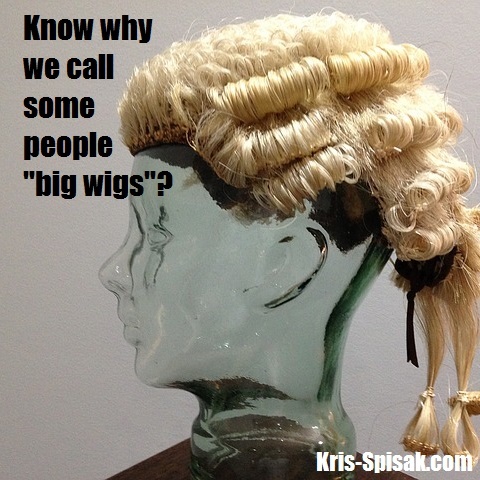

I like to say that I have big hair because I was born in Texas—and everything’s bigger in Texas—but let’s talk big hair of a different kind.
You know the expression “big wig” refers to someone important or influential, but did you know that it comes from the formal wig fashion trend started with the kings of France? Rumor has it that Louis XIII went prematurely bald and began wearing a wig, and by the time of Louis XIV, wigs were an essential status symbol for the noble class.
One could show off his or her wealth through the size of a wig. Was it simple? Full of curls? Falling past one’s shoulders? Piled up high toward the sky?
The “big wigs,” of course, were the ones with the highest status in society. Fashion trends have strayed past the ornate powdered wigs of centuries ago, but the idiom remains.
Now don’t you feel smarter? Brainier? Of course, having a big head is a different conversation altogether.
Sign-up for my writing tips email newsletter for more word trivia like this.
The post Etymology: “Big Wigs” appeared first on Kris Spisak.
January 6, 2017
Authors on Editing: Interview with Sarah R. Shaber
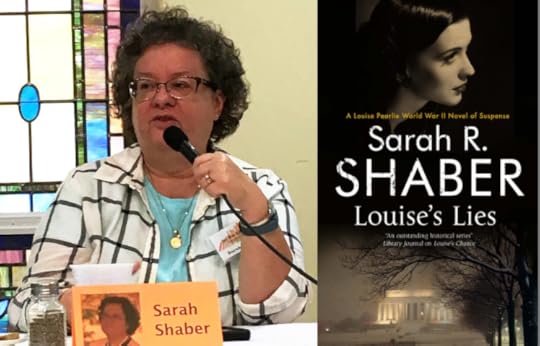
Don’t you love a good mystery? I know I do, although sometimes the writing and editing process seems a bit mysterious in itself. There are the mysteries of how the words move from your mind to fill the page, mysteries of the Muse (if one believes in such things), and maybe even mysteries over the placement of proper punctuation.
So what better person to talk about the mysteries of craft than an award-winning mystery writer with thirteen books and countless short stories to her name? Today, the talented (and always hard at work!) author Sarah R. Shaber allows us a glimpse into her writing and editing process.
Sarah Shaber is an award-winning mystery author from North Carolina. Her WWII historical mystery series features young widow Louise Pearlie, a government girl who works for the Office of Strategic Services, the United States’ first spy agency. Shaber is also the author of the Professor Simon Shaw mysteries, Blood Test, and editor of Tar Heel Dead. Her first book, Simon Said, won the St. Martin’s Press/Malice Domestic Award for best first traditional mystery. She was the Bouchercon15 (World Mystery Conference, 2015) Local Guest of Honor. Her home bookstore is Quail Ridge Books in Raleigh.
Q & A with Mystery Writer Sarah R. Shaber
Kris: Some writers’ favorite part is the research; others love the drafting and crafting; others love the later editing stages. What is your favorite part of writing a book and why?
Sarah: When I first began writing historical mysteries, the research was the most fun for me. But the more I write, the more eager I am to write than to research. I now set a firm time limit on research. What I want to do is get to writing the story. If I need to find out something while writing, that’s easy to do these days. I hate editing because by the time I get to that process, I am sick to death of the book and think it’s just horrible! I’m always relieved to send my manuscript off to my editor, and when I get it back, it takes a massive amount of willpower for me to do the final edits!
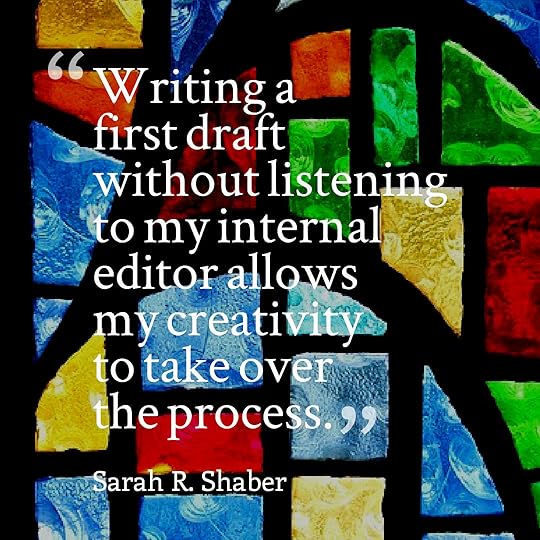 Kris: It’s so interesting to hear about the ebb and flow of a writer’s passion for a project and their estimation of it’s quality. Readers often have no clue about that side of the process or how hard the final editing can sometimes be. Do you edit as you write or do you plow forward at full steam, letting words and punctuation fall where they may?
Kris: It’s so interesting to hear about the ebb and flow of a writer’s passion for a project and their estimation of it’s quality. Readers often have no clue about that side of the process or how hard the final editing can sometimes be. Do you edit as you write or do you plow forward at full steam, letting words and punctuation fall where they may?
Sarah: I used to edit and rewrite my books as I was writing them, but I am a slow writer. I found that it took months for me to finish a book. So once I got a yearly contract, I began to just barrel ahead, writing 1000-1500 words a day even if I thought they were crap. This forced me to work out the plot in advance so that I wasn’t rewriting so much. And when I did turn to the second draft, I found less needed to be changed than I thought. And I think writing a first draft without listening to my internal editor allowed my creativity to take over the process in a way it didn’t when I was rewriting every day.
Kris: Editing seems particularly difficult sometimes when working with history. There’s a fine line between detailing a different time period and “data-dumping” fascinating but sometimes irrelevant information—even when you are really good about limiting your research time. How do you know what to include or when something should be cut?
Sarah: I am very right-brained, and much of my writing is done sort of unconsciously! Data dumping appears to be something I just know how not to do. I can say that the setting, which includes the time period, is part of the support system of a novel, not the main attraction. Story and characters are more important. As in any murder mystery, little should be included that doesn’t further the plot. So I put myself in Louise’s place. If she passes by a landmark, the normal reaction to it would be to mention it, or describe it briefly, not tell herself its entire history. When Louise puts on her clothes in the morning, or packs for a trip, it provides atmosphere to describe what she is wearing or her wardrobe, but if you go too deeply into it, the reader loses track of the story. I write short, so padding is not something that is often a problem for me!
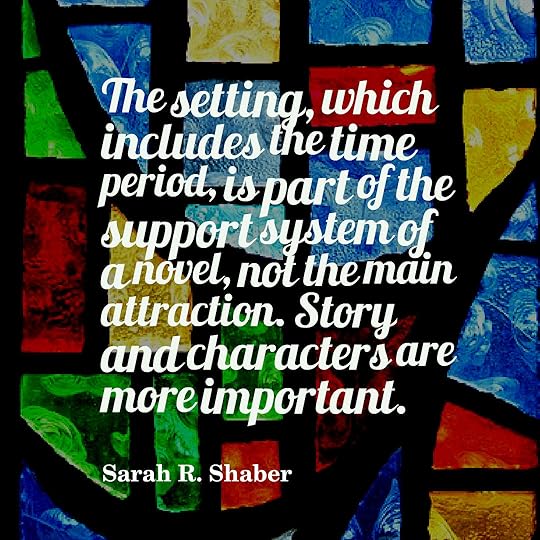 Kris: Speaking of short, is the process different when you edit a novel verses when you edit a short story?
Kris: Speaking of short, is the process different when you edit a novel verses when you edit a short story?
Sarah: I think writing a short story is more difficult than a novel because every word has to be perfect. So I do edit and rewrite more. Sometimes it takes me longer to write a short story than a chapter in a book—which is why I don’t often write them. I just don’t have the time when I have a book due every year.
Kris: And with a book every year, I imagine the nitty-gritty grammar issues don’t slow you down.
Sarah: I am an old-time grammar person. I took Latin in elementary school and diagrammed sentences in English class.
Did you catch that? Latin in elementary school and diagramming sentences in English class. It’s not quite a topic that makes one’s heart flutter, but there’s something to be said for such a background. Studies like this might not solve the mysteries of the universe or the mysteries of the writing or editing process—they surely won’t ensure you an annual book deadline like Sarah R. Shaber—but hey, they won’t hurt. Of course, if you missed it in your youth, there’s always Get a Grip on Your Grammar!
Thanks so much for your time, Sarah, and happy writing, everyone!
Sign-up for my writing tips email newsletter for more interviews like this.
The post Authors on Editing: Interview with Sarah R. Shaber appeared first on Kris Spisak.
January 4, 2017
Writing Tip 202: Capitalizing “Earth”


Some astronauts are down-to-earth; others need to be pulled back down to earth. Here’s hoping this guy doesn’t literally need to be pulled back to Earth.
Do you feel the earth move under your feet? How about the sky tumbling down, tumbling down?
Are you singing along in your head, or are you really just nervous about your grammar? Do you know when to capitalize the “e” in “Earth” or when to leave it in lowercase?
We all know the name of the third planet from the sun, but the proper noun vs. common noun confusion is an understandable one. Sometimes, we see it written as “Earth,” and sometimes, it’s just plain “earth.”
Here’s the quick “earth” capitalization breakdown:
When referring to the ground under your feet, “earth” is perfect.
When referring to someone being “salt of the earth,” “down-to-earth” “the scum of the earth,” “like nothing on earth,” “hell on earth,” or needing to “come back down to earth,” the lower case usage is preferred. (What on earth? So many “earth” idioms!)
When naming the planets in our solar system or when writing a sci-fi novel about intergalactic travel, use “Earth.”
When in NASA’s mission control and stating, “Earth to space station. Come in space station,” write “Earth.”
In short, if you’re referring to the planet as a whole, that’s the only time that you need to debate your capitalization of “earth” vs. “Earth,” and some argue, there’s some wiggle room even there.
If you’re still baffled about when to capitalize “earth,” remember that proper nouns usually don’t have articles like “the” in front of them. Following that logic, if you ever refer to “the earth,” it should be lower-cased.
Hopefully, the earth isn’t moving more than its usual speed under your feet, and you’re just singing along with me now. Capitalization shouldn’t make you lose control, down to your very soul…
Happy writing, everyone!
Sign-up for my writing and editing email newsletter for more writing tips like this.
The post Writing Tip 202: Capitalizing “Earth” appeared first on Kris Spisak.
January 3, 2017
Trivia: Non-hyphenated
December 31, 2016
Authors on Editing: Interview with Sara Grunden Kuhs
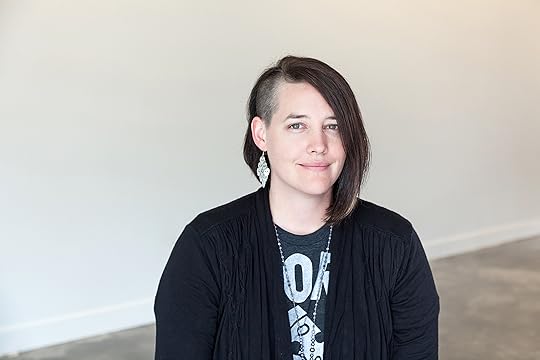
When I first mentioned this interview series—talking to professional writers about their editing processes—many I spoke with immediately jumped to “authorship” in terms of books. But you know what’s awesome about creatives? There are a lot of us, and we’re just about everywhere. We’re hunched over our laptops in coffee shops; we’re staring out windows at the falling rain; and we’re even in offices with conference rooms and break rooms and, if we’re lucky, ping pong tables. (Yes, ping pong tables.)
Some writers, in fact, don’t have to quit their day jobs to unleash their creativity, because writing is their day job. One such talented wordsmith was recently kind enough to let me pepper her with questions about editing and grammar.
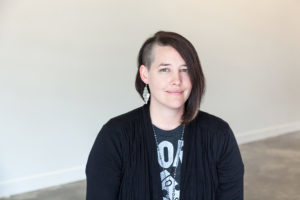 Sara Grunden Kuhs is a senior copywriter at The Martin Agency in Richmond, Virginia where she’s worked with many national brands over the last 12 years. She got her masters from VCU Adcenter (now Brandcenter) and did her undergrad at DePauw University in Indiana, majoring in writing and minoring in philosophy and psychology. In her spare time, she and her husband like to bowl, cook, wear hats, and entertain their two German Shorthaired Pointers.
Sara Grunden Kuhs is a senior copywriter at The Martin Agency in Richmond, Virginia where she’s worked with many national brands over the last 12 years. She got her masters from VCU Adcenter (now Brandcenter) and did her undergrad at DePauw University in Indiana, majoring in writing and minoring in philosophy and psychology. In her spare time, she and her husband like to bowl, cook, wear hats, and entertain their two German Shorthaired Pointers.
Q & A with Copywriter Sara Grunden Kuhs
Sara: I should say before I answer these questions that we have an amazing team of copy editors at The Martin Agency who look over every single piece of writing and make sure that it’s grammatically correct, so that’s not something I usually have to do on my own. Now, I do like for my stuff to be as correct as possible when it goes to them. But I don’t have to worry if it’s not. Hmm, maybe I need to get them to read over my answers …
Kris: No pressure at all. I’ll start out with an easy one. Do you have any word choice pet peeves that make you shudder just a little bit every time you hear them said?
Sara: In my personal life, “less” vs. “fewer” is something that just grates on my ears when I hear it used wrong (which my husband does all the time, on purpose.) But at work, we tend to worry more about how something comes across—is it catchy, memorable, witty?—versus whether or not it is technically correct. We will definitely break grammar rules when it feels necessary. Especially since we usually need things to be conversational, and at times, perfect grammar can seem a bit stodgy. A great example is the classic Apple tagline: “Think different.” It just wouldn’t have had the same edge if it was “Think differently.”
Kris: When you’re writing commercials, you clearly have a very limited word count that you’re working with. Do you have any advice for tightening writing down to its core while still containing the full message you’d like to convey?
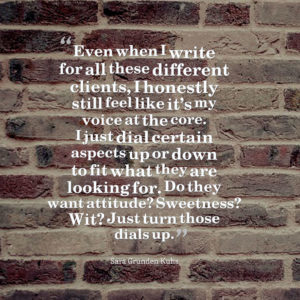 Sara: This is something I struggle with as I tend to be very wordy (you’re probably going to have to edit my answers for this blog!) Here are three pieces of advice. First, try to be concise from the get-go. It’s so much harder to see a finished piece of writing and then have to cut 25% of it out. Second, don’t just think about cutting words—you can only cut so many. Instead, try to rephrase the whole idea and shorten it that way. And finally, we have a saying in advertising: sometimes you have to “kill your darlings.” Sometimes you fall so in love with a line that you just don’t want to cut it. But if it’s not adding to the idea, it has to go!
Sara: This is something I struggle with as I tend to be very wordy (you’re probably going to have to edit my answers for this blog!) Here are three pieces of advice. First, try to be concise from the get-go. It’s so much harder to see a finished piece of writing and then have to cut 25% of it out. Second, don’t just think about cutting words—you can only cut so many. Instead, try to rephrase the whole idea and shorten it that way. And finally, we have a saying in advertising: sometimes you have to “kill your darlings.” Sometimes you fall so in love with a line that you just don’t want to cut it. But if it’s not adding to the idea, it has to go!
Kris: The poor darlings. And speaking of darlings, I’ve always thought that writing in the voice of a brand is a lot like writing in the voice of a character when one writes fiction. How do you edit yourself to make sure you’re being true to that voice through everything you produce (e.g., social media posts, tv commercials, radio spots, etc.)?
Sara: There are a lot of people that look at my work and evaluate whether or not it feels like it’s in the brand voice, and believe me, they aren’t shy about letting me know if it isn’t. But even when I write for all these different clients, I honestly still feel like it’s my voice at the core. I just dial certain aspects up or down to fit what they are looking for. Do they want attitude? Sweetness? Wit? Just turn those dials up. I can make it more conversational and casual, or more formal. I just did a radio spot in the voice of a Spanish conquistador, and so I layered on some effusiveness and language choices that I thought he would make—but it’s still my voice underneath all of that.
Kris: There’s a fine line between being explicit in your writing (i.e., the Spanish conquistador says, “buy this product”) versus being implicit in your writing (i.e., creating an ad with the conquistador that makes someone want to buy/act now). Do you ever have to edit yourself on this note?
Sara: That fine line is a place where we are constantly working with our clients, trying to push our work more towards the implicit, while clients tend to want work that is very explicit. But it does change depending on the medium. For TV and radio, you have time to set a scene and get an idea across, so you can afford to be more of a storyteller, but in an online banner, for example, usually you need to get straight to the point. Then in social, it’s usually more about trying to get a person to interact with and like your brand, versus trying to sell a product. So it varies quite a bit.
Kris: When you’re working with a client, what is the hardest part of revising your work to meet both your standards and theirs?
Sara: The hardest part is that in the end you have to remember that the work is not yours. Yes, you are the one doing it, putting in the time, the effort. You give up nights and weekends. You conceive it and shape it. But when you get to the end of it all—it’s not yours. It’s sort of like going through an entire pregnancy and birth (I imagine) and then cleaning off the baby and handing it off to someone else. I think that’s a huge difference between advertising writers and what I would call “real writers” like you. In the end you own all of your work. We don’t.
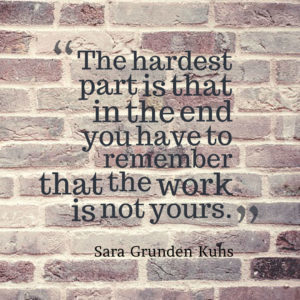 Kris: I’m fascinated by this imagined construct of the “real writer.” I think she’s drinking wine and smoking cigars in a French café decades ago. Some argue that writing “literature” is what makes a writer, while others say it’s a matter of a paycheck, or a publishing deal, or having hands dirty with ink (or pained by carpel tunnel syndrome). If we are putting our ideas out there, spending those nights and weekends, as you said, I claim we’re all real writers, aren’t we? Actually, don’t answer that. Let me get back to the important issues here. What are your thoughts on the Oxford comma versus the serial comma?
Kris: I’m fascinated by this imagined construct of the “real writer.” I think she’s drinking wine and smoking cigars in a French café decades ago. Some argue that writing “literature” is what makes a writer, while others say it’s a matter of a paycheck, or a publishing deal, or having hands dirty with ink (or pained by carpel tunnel syndrome). If we are putting our ideas out there, spending those nights and weekends, as you said, I claim we’re all real writers, aren’t we? Actually, don’t answer that. Let me get back to the important issues here. What are your thoughts on the Oxford comma versus the serial comma?
Sara: Is it terrible that I have no idea what they are? It’s just not the sort of thing that we ever have to worry about in advertising. I don’t know MLA standards either.
Kris: Do you have a favorite trick to remembering any tricky word pairs (e.g., phase/faze, mute/moot, meddle/metal/mettle…)?
Sara: This one isn’t tricky for me, but my work partner probably asks me once a week if “lose” is spelled with one O or two. I tried telling her that for “lose” you lose an O. But it must not be a great trick, because she still asks me all the time. Art directors can’t spell.
Kris: Some people geek out about the revising and proofing process, making sure everything is exactly how it should be. Are you that person, or if not, what’s your favorite part of the creative process?
Sara: My favorite part of the process is production—I think most advertising creatives feel the same. You’ve gotten everything approved and (mostly) solidified, and you get to go make it. It’s definitely still stressful, but also truly amazing when you think about it. You start with just two people in a room thinking about an idea, and in the end you have hundreds of people working to make it come to life. Sometimes when I’m on set looking around at all the people, it’s a little overwhelming. Of course, none of those people care one bit that you wrote the commercial, so that helps bring you back to earth!
It all starts with someone sitting in a room thinking about an idea. No matter what it is that you write or why you write, this image sounds familiar, doesn’t it? We may not all have our creative ideas wrap up with a production team, but the good projects find their way of coming to life if we make the time.
And seriously, there’s a ping pong table in Sara’s office. How’s that for a brainstorming device? Side-note: never challenge Sara Grunden Kuhs to a game of ping pong. She will win.
Thanks so much for your time, Sara, and happy writing everyone!
Sign-up for my writing tips email newsletter for more interviews like this.
The post Authors on Editing: Interview with Sara Grunden Kuhs appeared first on Kris Spisak.
December 28, 2016
Writing Tip 201: “Axe” vs. “Ax”


Whether it’s a pick-ax, a battle-ax, an ax-hammer, or Axl Rose, Americans like to ax that extra “e.”
Once and for all, is it “axe” or “ax”? Has this question ever bothered you too?
I hope you don’t have an ax/axe to grind about words that have two correct spellings. I’ve talked about “imposter” vs. “imposter,” “preventative” vs. “preventive,” and “advisor” vs. “adviser” before–among others–but here’s another one to add to that list.
Both “axe” and “ax” are acceptable spellings when you’re referring to a sharp tool used for cutting wood.
In short, Americans largely give the ax to the “e” at the end of “axe,” while English speakers elsewhere on the globe tend to keep it. I could say there’s an argument here since this word came from the Old English word æcs, which does not have an “e”; however, since there is also not an “x,” it’s not an argument that will really hold up anywhere except for a night where everyone’s had a few drinks listening to some wild guitarist playing his ax (i.e., his instrument, another acceptable definition of this word).
So choose whichever form you wish. No need to be sharp with someone who spells it differently from you.
Writing Tip 201.1: The plural of both “ax” and “axe” is “axes.” Interestingly, this is also the plural of the word “axis.” There’s a mad mathematician thriller in there somewhere if you can find it.
Happy writing, everyone!
Sign-up for my writing tips email newsletter for more writing tips like this.
The post Writing Tip 201: “Axe” vs. “Ax” appeared first on Kris Spisak.

